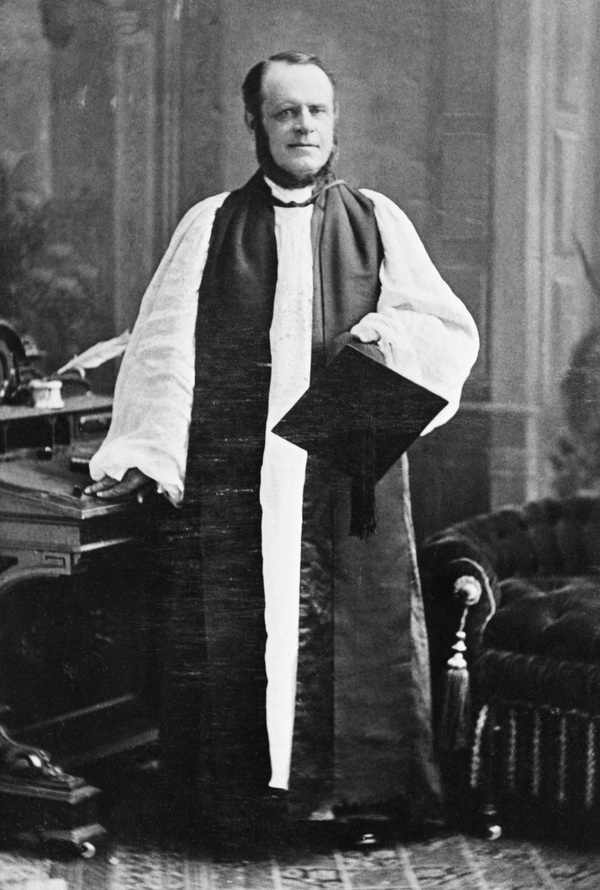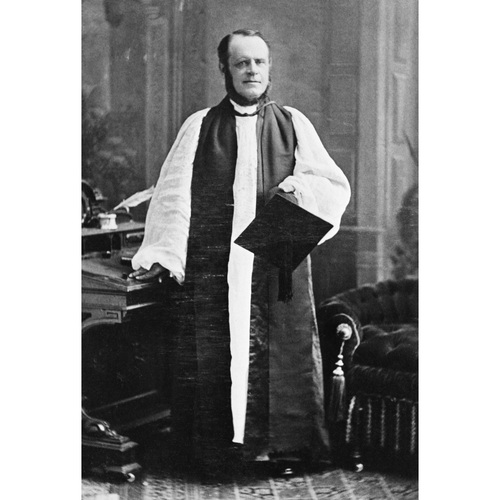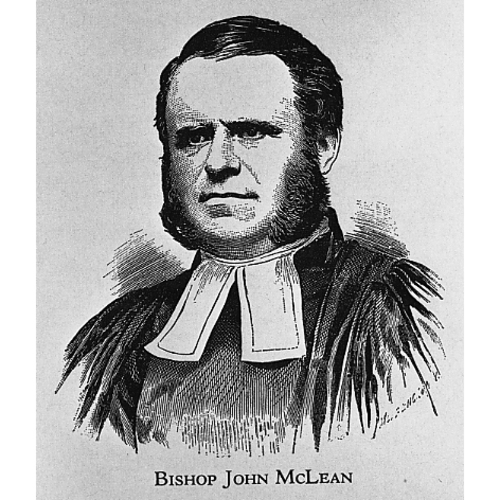
Source: Link
McLEAN (MacLean), JOHN, Church of England bishop and educator; b. 17 Nov. 1828 at Portsoy (Grampian), Scotland, son of Charles McLean, a merchant, and Jannet Watson; m. in 1861 Kathleen Wilhelmina, daughter of the Reverend Richard Flood and Frances Mary Blake, at London, Canada West, and they had ten children; d. 7 Nov. 1886 at Prince Albert (Sask.).
Trained in science and classics, John McLean graduated with an ma from King’s College (University of Aberdeen) in Scotland, in 1851. He then worked in London, England, for a manufacturing firm managed by an uncle and, having acquired some knowledge of French, German, and Spanish, was placed in charge of its foreign correspondence. Probably soon after arriving in London he became a member of the Church of England, and by 1858 he had also decided to seek ordination. In these decisions his continuing friendship with Robert Machray*, a fellow student at Aberdeen, played a part. Machray, who had been ordained in 1856 following a successful career at the University of Cambridge, became bishop of Rupert’s Land in 1865. McLean, however, preceded him to British North America in 1858, after Isaac Hellmuth*, the secretary of the Colonial and Continental Church Society in British North America, persuaded him to emigrate to Canada West. There he was ordained deacon on 1 Aug. 1858 and priest on 15 December by Benjamin Cronyn*. Bishop Cronyn appointed him chaplain to the garrison and curate of St Paul’s Cathedral in London, Canada West. There McLean remained until 1866 when he was summoned by Machray to Rupert’s Land to assist in the revival of St John’s College in Winnipeg as a theological seminary and higher school.
McLean and Machray, like John Strachan* earlier, may have had Episcopalian antecedents and connections, but it is more certain that, in the circumstances of the disruption of the Church of Scotland, they were drawn to the Church of England. Both were strongly evangelical, and, although staunch churchmen, neither had any sympathy with the Tractarian movement, particularly influential in the Church of Scotland. Yet both were inclined to take a conservative position on most issues, and felt a powerful attraction to the order and discipline of the Church of England. Nor, as young Scots of modest background and exceptional ability, do they seem to have been entirely oblivious to the greater opportunities offered by a career south of the Scottish border.
McLean’s numerous activities in Rupert’s Land after 1866 reflected not only Machray’s plans for the extension of Anglican work in what was expected to be an era of development, but also his limited resources. At the end of December 1867, McLean began to hold services in a hall in the “rising little village of Winnipic,” the beginning of the parish of Holy Trinity. Between 1866 and 1874 he taught at St John’s College, of which he was warden and professor of divinity. He was also appointed examining chaplain to the bishop of Rupert’s Land, archdeacon of Assiniboia, and, finally, rector of St John’s Cathedral at Winnipeg.
During the Red River disturbance of 1869–70, McLean joined Machray in urging the Protestant inhabitants, the majority of whom were Anglican, towards a moderate course, and in advising them to send English-speaking delegates to the convention proposed by Louis Riel for January 1870. At this same time, McLean attended Riel’s prisoners, including Charles Arkoll Boulton*. Later he joined with the two ministers, John Black, Presbyterian, and George Young*, Methodist, to urge resistance to the Fenian raid of October 1871.
In 1873 the Church of England authorities were contemplating dividing the vast diocese of Rupert’s Land. McLean went to Britain that year to raise funds for the proposed new diocese of Saskatchewan which would include much of the southern portions of the future provinces of Alberta and Saskatchewan. This was not McLean’s first search for funds; in 1871, for St John’s College, he had raised over $8,000 in Canada, where, as Machray often complained, support for northwestern missions was far from generous. On 3 May 1874 the archbishop of Canterbury consecrated McLean as the first bishop of Saskatchewan.
When he returned to the northwest, McLean went to the Prince Albert settlement, arriving there by dog-train in February 1875. He made arrangements for the building of the log church of St Mary (west of the present city), and there, on 9 Jan. 1876, he held his first ordination. In the winter of 1875–76 he also visited the established Stanley Mission (on the east shore of Mountain Lake, Sask.), where Holy Trinity Church had been built in 1859 by Indians under the direction of the Reverend Robert Hunt. The next winter he travelled to Fort Edmonton; here he helped William Newton, who had recently established the Anglican mission, arrange for the building of the forerunner of the present All Saints’ Cathedral.
McLean describes his diocese at the time of its creation as “a vast area containing about 30,000 Indians, with a few small settlements of white people . . . no endowments, no missionaries, no churches.” He had in fact an ordained missionary, a lay missionary, and a native deacon, but the challenge was indeed formidable. Despite the disappointingly slow development of the west in the next decade, McLean laid the foundations for the work of his church among white settlers and Indians. Although reduced in size in 1883 by the creation of the diocese of Qu’Appelle, McLean’s diocese had 22 clergy and seven catechists by 1886. This reduction, which strained his friendship with Machray, McLean accepted with reluctance. In addition to building churches and mission stations and raising substantial endowments, McLean established Emmanuel College at Prince Albert, formally opened in 1879. Primarily conceived as a teaching centre for a native clergy, it also did the first work at the high school level in the North-West Territories, and McLean envisioned the college as the nucleus of a university. In May 1883 “an act to incorporate the University of Saskatchewan and to authorize the establishment of colleges within the limits of the diocese of Saskatchewan” received royal assent. McLean and Lawrence Clarke were among those named to the university’s first board.
In Prince Albert McLean was perhaps the leading figure, as the local newspaper and the journal of the HBC post show. The activities of his large family were followed with a similar interest, not unsurprising in an isolated community. Three of the five daughters were married in Prince Albert in the 1880s to clergymen, and the family was still in residence there in the 1890s. McLean seems to have had good relations with his laymen, but could be critical of clerical brethren such as the learned but eccentric Newton or the Reverend George McKay who, busy ministering from Fort Macleod (Alta) to Indians, mounted police, and ranchers, failed to keep in touch with his bishop. The church at large recognized McLean through honorary degrees in 1871 from Kenyon College, Ohio, Bishop’s College, Lennoxville, Que., and Trinity College, Toronto, and in 1881 from St John’s College, these having, it is worth noting, high church leanings.
Despite his difficulties McLean’s accomplishments were substantial. He made valiant efforts to secure Anglican missionaries for the settlers attracted by the construction of the Canadian Pacific Railway, but his headquarters in Prince Albert was remote from the railway route chosen and he was preoccupied with the established work among the Indians and mixed-bloods. This work was not made easier by the strains that led to the North-West rebellion of 1885. Nevertheless, by the time of his death he had taken important steps towards the training of a native clergy, he had consolidated Anglican missionary work among the northern Crees, and had initiated it among the Blackfeet, Bloods, Piegans, and Sarcees of southern Alberta. McLean attributed to the work of the missionaries the comparative quietness, during the rising, among the Indians and mixed-bloods under Anglican influence.
In August 1886 after his last synod McLean visited his western missions, including Calgary and Edmonton. At the latter he was seriously injured when a runaway team caused him to be thrown from the “democrat” in which he was travelling. Already suffering from Bright’s disease, and determined to reach his home in Prince Albert, the bishop, in a cold October, was floated down nearly 500 miles of the North Saskatchewan River, in a small boat. He reached home but died on 7 November.
He was buried in St Mary’s churchyard with all the pomp the Anglican Church and the town of Prince Albert could muster. The Prince Albert Times and Saskatchewan Review mourned him as the town’s best friend, “the central figure of our community,” and his old friend Machray praised his “great and varied gifts, readiness of utterance, and unceasing devotion.”
The most important sources for McLean’s activities during his episcopate are the records of the Synod of the Diocese of Saskatchewan (Saskatoon) and the archives in London of the Society for the Propagation of the Gospel and of the Church Missionary Society.
PAM, HBCA, B.332/a/1; MG 2, C14; MG 3, D1; MG 12, B2. Prince Albert Times and Saskatchewan Rev. (Prince Albert, Sask.), 1882–86. Boon, Anglican Church. Robert Machray, Life of Robert Machray, D.D., LL.D., D.C.L., archbishop of Rupert’s Land, primate of all Canada, prelate of the Order of St. Michael and St. George (Toronto, 1909). E. K. Matheson, “John McLean,” Leaders of the Canadian church, ed. W. B. Heeney (2nd ser., Toronto, 1920), 225–52. William Newton, Twenty years on the Saskatchewan, N.W. Canada (London, 1897). W. F. Payton, An historical sketch of the diocese of Saskatchewan of the Anglican Church of Canada (n.p., [1973]).
Cite This Article
Lewis Gwynne Thomas, “McLEAN (MacLean), JOHN (1828-86),” in Dictionary of Canadian Biography, vol. 11, University of Toronto/Université Laval, 2003–, accessed March 1, 2026, https://www.biographi.ca/en/bio/mclean_john_1828_86_11E.html.
The citation above shows the format for footnotes and endnotes according to the Chicago manual of style (16th edition). Information to be used in other citation formats:
| Permalink: | https://www.biographi.ca/en/bio/mclean_john_1828_86_11E.html |
| Author of Article: | Lewis Gwynne Thomas |
| Title of Article: | McLEAN (MacLean), JOHN (1828-86) |
| Publication Name: | Dictionary of Canadian Biography, vol. 11 |
| Publisher: | University of Toronto/Université Laval |
| Year of publication: | 1982 |
| Year of revision: | 1982 |
| Access Date: | March 1, 2026 |




